MercoPress. South Atlantic News Agency
Tag: European Central Bank
-
Friday, May 11th 2012 - 13:10 UTC
Irish experience advice on how to rid banks of toxic real estate assets

Spain’s plan to rid banks of toxic real estate assets is reviving the politically heated debate over how creditors and taxpayers should share the vast losses still being incurred by the Euro zone debt crisis. Nowhere is the issue in sharper relief than in Ireland.
-
Thursday, May 10th 2012 - 20:18 UTC
Europe at risk of Japanese-style ‘lost decade’ claims Dutch central bank

Europe is at risk of a Japanese-style “Lost Decade” of low economic growth, weak consumer spending, poor company investment and tougher borrowing conditions, the Dutch central bank said on Thursday.
-
Tuesday, April 24th 2012 - 00:52 UTC
Spain back in recession and already high unemployment expected to increase
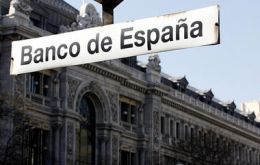
Spain's jobs-scarce economy plunged back into recession in the first quarter of 2012 as employment slumped even further, the Bank of Spain said on Monday. Barely two years after emerging from the last downturn Spain slid into recession again with two consecutive quarters of economic contraction the central bank said in a report.
-
Friday, February 24th 2012 - 07:43 UTC
EU confirms Euro zone heading for its second recession in three years
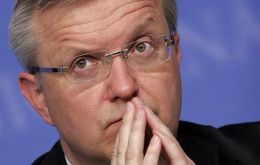
The Euro zone's economy is heading into its second recession in just three years, while the wider European Union will stagnate, the EU executive said, warning that the currency area has yet to break its vicious cycle of debt.
-
Thursday, January 5th 2012 - 05:08 UTC
EU slower December inflation could be followed by more interest rate cuts

Euro zone inflation eased from last year's peaks of 3.0% in December, the first sign of a fall in price growth this year that analysts expect will create room for more interest rate cuts to help the weakening economy.
-
Thursday, January 5th 2012 - 05:05 UTC
Belgian board member named chief economist of European Central Bank

European Central Bank has named Belgian executive board member Peter Praet as its chief economist following the resignation of Juergen Stark.
-
Thursday, December 22nd 2011 - 05:01 UTC
European Central bank supports financial sector with ultra-cheap € 490 billion
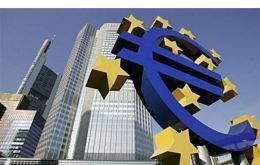
Europe's banks borrowed nearly 490 billion Euros from the European Central Bank at its first-ever offer of three-year loans on Wednesday, encouraging demand for the Euro and stocks on hopes the funding will ease the two-year old debt crisis.
-
Tuesday, December 13th 2011 - 06:14 UTC
Euro zone deal had to be supported by the ECB in its first test
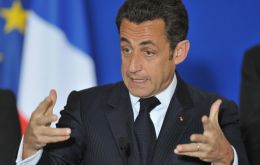
European summit deal to strengthen budget discipline in the Euro zone failed to restore financial market confidence on Monday, forcing the European Central Bank to step in again gingerly.
-
Friday, December 9th 2011 - 07:02 UTC
European Central bank cuts rate to record low 1% to fight recession and deflation

The European Central Bank cut interest rates by a quarter of a point Thursday to counter the twin threats of recession and deflation in the Euro zone, and is expected to unveil fresh measures to help banks hurt by the bloc's debt crisis.
-
Thursday, November 17th 2011 - 19:56 UTC
Germany and France clash over a greater role for the European Central bank
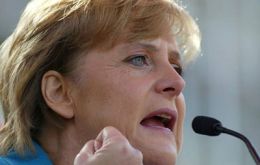
German Chancellor Angela Merkel reiterated Thursday her opposition to a greater role for the European Central Bank in helping to solve the Euro zone debt crisis, saying political action was required.
